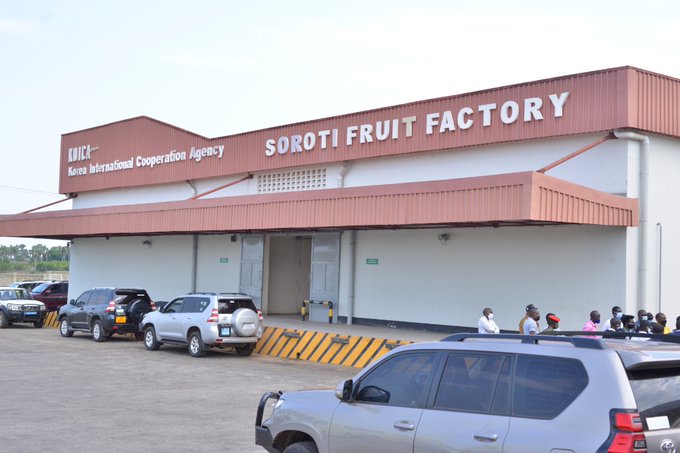MPs protest sale of Soroti Fruit Factory
Soroti Fruit Factory was launched in April 2019 and started commercial operations in October 2019 after Uganda National Bureau of Standards (UNBS) issued the factory certification.

Legislators from Teso Sub-region have protested Government’s decision to privatise Soroti Fruit Factory, saying that the reason that the factory is making losses is baseless, because Government has failed to provide requisite funds for the smooth flow of operations at the factory.
Leading the protest was Jonathan Ebwalu who tasked Prime Minister, Robina Nabbanja to explain why Government has moved swiftly to privatise Soroti Fruit Factory before implementing the 21 recommendations made by Parliament on how to improve operations of the factory.
The Committee recommended the purchase of a fully automated packaging lane, there were 21 recommendations and only the interdiction of the CEO and setting up of the board have been fulfilled. Before we even go ahead to give the factory to a foreign investor, the Prime Minister should tell us why we haven’t implemented the recommendations of Parliamen.
He revealed that in April 2019, President Museveni commissioned Soroti Fruit Factory with the aim of improving the socio-economic condition of the people in that region but residents were recently left in shock after the
Minister of State for Teso Affairs, Clement Ongalo Obote informed the local leaders of plans by Government to relinquish its interests into the factory and hand it over to the former First Lady of Ethiopia Azeb Mesfin Haile, a position he said the region has protested.
Ebwalu added that in February 2022, Parliament’s Trade Committee investigated challenges facing Soroti Fruit Factory and made 21 recommendations amongst which included the need for funding for the Factory to buy a weighbridge, build a warehouse for storage of the fruits, as well as the need to expand the water treatment plant but all these haven’t been addressed, by Government, which instead opted to sell off the factory.
Prime Minister Nabbanja defended President Museveni’s decision arguing that although the President initiated the establishment of the Soroti Fruit Factory to increase the household income amongst farmers, the Factory is making losses, which prompted the need for a private investor to take charge.
She said, “…it is absurd that even up to now, that fruit factory isn’t helping our farmers and so, he came up with an idea that we get an investor who will help us put it in place because Uganda Development Corporation has naturally failed to manage that factory…”
Deputy Speaker, Thomas Tayebwa tasked the Attorney General, Kiryowa Kiwanuka to explain what will happen to the 20% shares owned by the local community remarking,
“The factory belongs to Government, the issue will be on the 20% shares which are owned by the farmers. How are you treating those shares, otherwise if the investor is coming to make the factory run better and buy the fruits from the farmers. Government has a right to treat its shares the way it wants, is Government selling the 100% shares, has it engaged the community to look at what will happen to the 20% shares they own?
The Attorney General said the deal hasn’t been actualised because it was merely a process but said the 20% shares of the local community will likely be maintained for the owners. Kiryowa explained,
What the MP has talked about here is a process in thought. Nothing has been signed, nothing has been concluded but the purpose is to find someone to invest in this institution. The 20% shares of the farmers and the fundamental purpose of that factory to offtake fruits from the region is going to be maintained.
Susan Amero (DWR Amuru), however, questioned the motive behind people advising the President to sell off the factory, saying that although the Factory started with the aim of helping the people in Teso, but from the time it started operating, it never bought fruits from Teso, but instead opted to purchase fruits outside Teso region.
“Are the people who are advising the President to establish this kind of factory doing it in the right way? Did they do due diligence to establish this factory because I see many of them mushrooming where are they going to end?” asked Amero.
Prime Minister in response blamed the extension workers in Teso for failing to advise farmers on the nature of fruits required by the factories, which prompted the factory to seek for fruits outside Teso and Uganda stating, “It is only that the gross exceeded the investment. The purpose of the fruit factory was to help the people from Teso, but our extension workers didn’t guide our farmers on which fruits to grow.”
Soroti Fruit Factory was launched in April 2019 and started commercial operations in October 2019 after Uganda National Bureau of Standards (UNBS) issued the factory certification. Government of Uganda while represented by Uganda Development Corporation (UDC) signed a Memorandum of Understanding in August 2012 with the Korea International Cooperation Agency (KOICA).
At its establishment, Government had argued that Soroti Fruit Factory was established to add value to the fruits that were abundantly underutilized to address the high post-harvest loses, provide market for farmer’s produce, create employment opportunities along the value chain which in effect would increase and diversify household incomes within the greater Teso Region.
The farmers told MPs that, a double sack of oranges weighing about 120kgs is bought from the farmers by TEFCU at a meagre price between UGX 15,000-20,000 without weighing but later, the Union sells the same bag of oranges to the Fruits Factory at UGX72,000, with Parliament noting that buying fruits from farmers without weighing them is exploitation of the highest order and could be the reason as to why some farmers have resorted to cutting down their orchards while others have neglected the fruits to fall and rot in the orchards because they no longer appreciate the value of the fruits.



